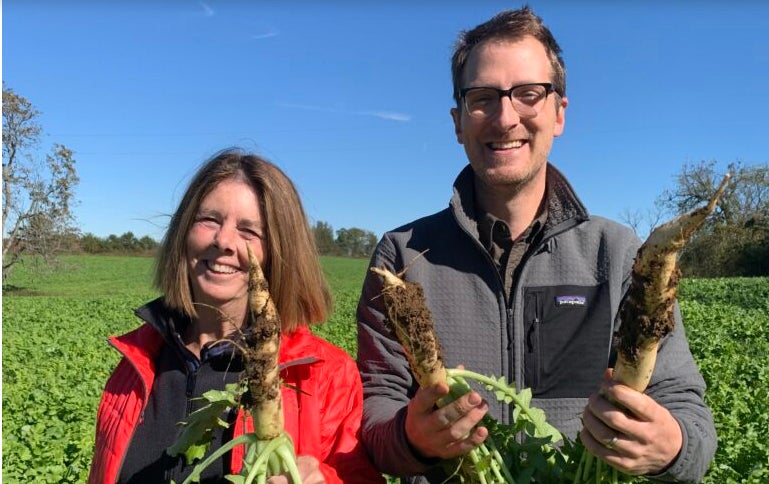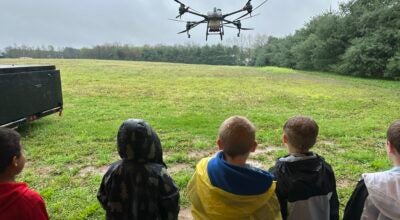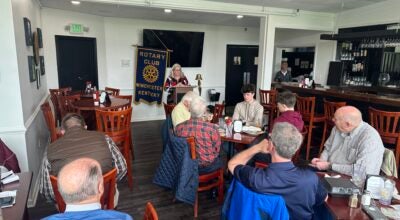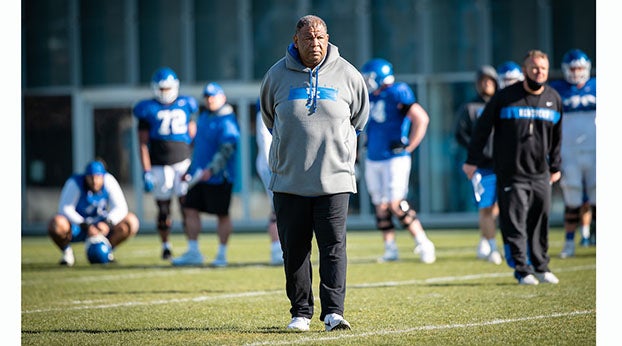Mt. Folly Farm sets an example
Published 11:41 am Thursday, January 20, 2022

- Laura Freeman (left) and AFT’s Scott Franklin (right) show how cover crops like tillage radish break up soil compaction, increase aeration, and improve water infiltration in one of Mt. Folly’s fields. (Submitted photo)
|
Getting your Trinity Audio player ready...
|
When it comes to farming, Laura Freeman pushes—and pushes hard—for the change she knows is needed.
Several examples speak to Laura’s passion for transforming agriculture. In the mid-1980s, she founded a small company focused on selling lean, growth hormone-free beef, a market rarity at the time.
After peddling her products from a freezer on her farm in Clark County, Kentucky, she soon expanded into two independent grocery stores. She then persuaded a reluctant grocery chain to place her company’s beef in six stores. Soon, Laura’s Lean Beef was providing customers across the United States and Canada with nutritious grass-fed beef.
Beyond the meat company, which she sold several years ago, Freeman continues to work for positive change on a smaller—but no less important—scale.
“The beef company taught me that I was not powerful enough to change the entire food system alone,” she explains. “So I thought, ‘If I can’t change the national food system, maybe I can model what the food system needs to be locally. Then maybe we can expand that model.’”
Toward that end, Freeman has adopted a host of regenerative agricultural practices on historic Mt. Folly Farm, where she is a 7th generation steward.
Her farm is Certified Organic. Her soil is healthy, thanks in part to reduced tillage and no-till planting. Her hemp is planted with a buckwheat cover crop, and her livestock graze on lush grasses and return nutrients to the fields where crops are grown. Freeman pays attention to her land’s needs and fits the farming to the farm. She encourages others to do the same, even if it means using practices that differ from hers.
Part of her regenerative efforts include partnering with American Farmland Trust. In particular, Laura participates in AFT’s on-farm conservation innovation trials and Commercial Rye Cover Crop Initiative. As part of the latter project, Laura and her farm managers plant cereal rye in the fall to reduce erosion, improve soil structure, and increase soil organic matter. They then harvest the rye grain in the early summer to use in local Kentucky products, like flour for bread that she sells in town. Freeman even launched a distilling company—Wildcat Willy’s—that turns Mt. Folly’s raw rye and corn into Kentucky’s most popular spirit: bourbon.
Freeman is grateful for her relationship with American Farmland Trust.
“Working with AFT is a godsend for me,” she says. “It gives legitimacy to what we’re doing. It gives us people to talk to and call up. AFT helps us address questions about all kinds of practices and challenges. [The organization] is helping change the way we farm.”
Beyond enhancing soil health, Freeman thinks her work with AFT could help address climate change. With a thoughtful approach, farming can be a solution—rather than a huge contributor—to one of the world’s most pressing challenges.
The change that Freeman seeks—including reinvigorating her hometown’s economy, addressing rural poverty, and advancing environmental justice—does not come easy. She’s faced, and still faces, plenty of difficulties. Yet she’s still working and caring, hoping and trying.
“My great asset is that I just keep going,” Freeman says. “I just keep plowing along.”
In doing so, she acts as a careful, committed steward: of her farm, her community, and our world.
To learn more about Mt. Folly Farm, Wildcat Willy’s, and more, visit: https://mtfollyfarm.com/
Contributor Brooks Lamb wrote this story that originally appeared in American Farmland Trust magazine.





